Following a low FODMAP diet has been known to improve various digestive system issues, especially irritable bowel syndrome (IBS). This type of diet restricts certain types of carbs called nondigestible short-chai carbs.
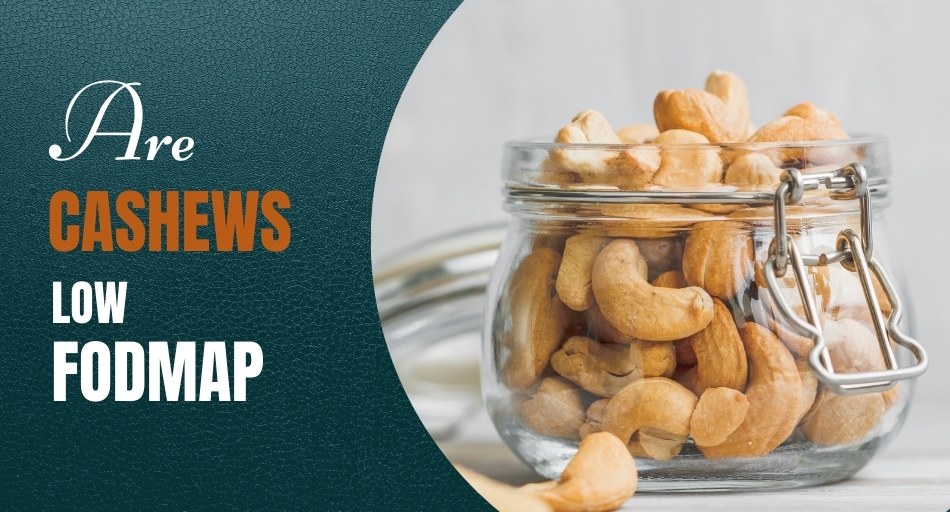
As you know, a lot of foods are high in carbs, so they might be high in FODMAPs as well. But what about those rich in other nutrients like protein and fats?
For example, are cashews high in FODMAPs? Or are they suitable for a low FODMAP diet as they primarily contain other nutrients?
Table of Contents
Are cashews high in FODMAPs?
Unfortunately, cashews are rather high in FODMAPs. Because of that, they shouldn’t be consumed in large amounts by those dealing with digestive system issues like IBS and many others.
On the bright side, cashews are rich in healthy fats and various minerals as well as antioxidants. All of these nutrients and plant compounds work together to keep you healthy and prevent various diseases.
So, if you can tolerate cashews, adding small amounts to your diet can be a great idea.
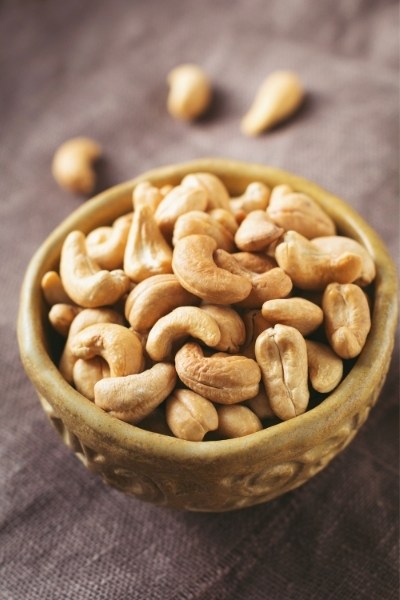
How high in FODMAPs are cashews?
A serving of 20 cashews is considered a high FODMAP food. So, it’s best to limit these nuts on a low FODMAP diet and if you suffer from severe IBS flareups.
On the other hand, smaller servings might be OK, but it’s still crucial to add cashews slowly to your diet, especially at the beginning.
Once you see that your digestive system can tolerate small amounts of this type of nut, you can gradually increase the amount.
Are cashews good for you?
Most of the calories in cashews come from fats, but that’s not bad. In fact, the fat found in cashews is heart-healthy.
In fact, studies show that cashews are high in unsaturated fats, which are linked to a lower risk of heart disease and even premature death.
In addition, the healthy fast in cashews paired with the fiber they contain can help you lose weight.
Research shows that diets high in nuts like cashews can help curb your appetite and make you feel fuller after eating.
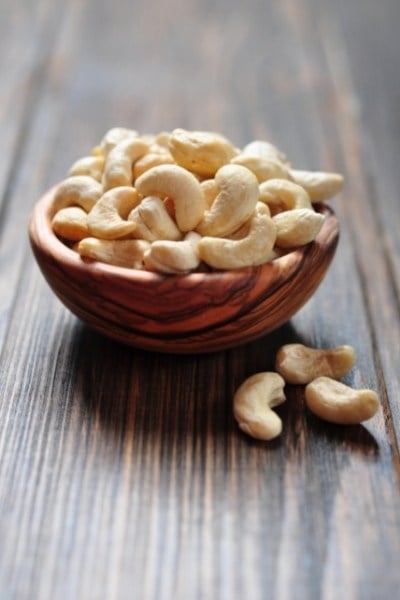
The fiber can also help soak up excess stomach acid, reducing your risk of acid reflux and heartburn, especially if you’re prone to these issues.
What’s more, cashews are rich in antioxidants – plant compounds that lower your risk of oxidative damage to your cells and, thus, various chronic conditions, such as heart disease, diabetes, and even cancer.
These antioxidants also reduce inflammation, which is beneficial for people with digestive system issues.
So, cashews can help you control some symptoms of these conditions.
When it comes to minerals, cashews contain a large dose of copper. In fact, just a one-ounce serving of dry-roasted cashews provides you with 31% of your daily recommended need for this mineral.
Together with iron, copper is important for the formation of red blood cells and the prevention of anemia.
It also aids in maintaining healthy bones, blood vessels and nerves, and immune function.
Because of all that, getting enough copper from your diet can lower your risk of cardiovascular disease as well as osteoporosis.
Cashews also make for an excellent source of magnesium and zinc. These two minerals contribute to a healthy immune system, which reduces your risk of various health conditions. As a result, you’re also less likely to catch many viral infections.
Zinc also improves metabolic function, which can be beneficial for weight loss. Similarly, magnesium helps relieve muscle tension and reduce fatigue.
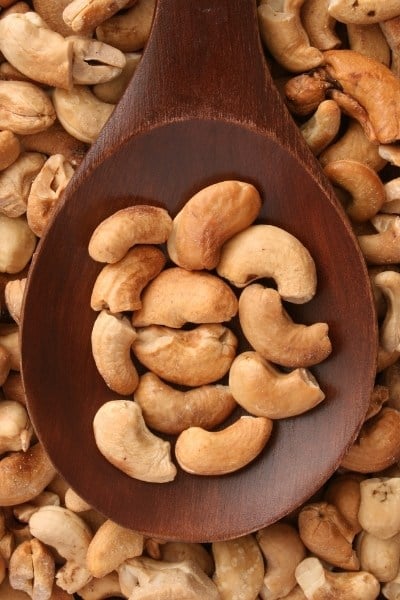
Because of that, these two minerals can be great for people who exercise a lot.
Lastly, one important vitamin that cashews contain a lot of is vitamin K. This micronutrient is responsible for forming blood clotting factors and bone metabolism.
Because of that, it helps with wound healing and osteoporosis prevention.
Vitamin K is a fat-soluble vitamin. This means that getting it from fat-containing foods increases its absorption. So, getting vitamin K from cashews is a great idea.
Can you eat cashews on a low FODMAP diet?
Cashews are considered a high FODMAP food. A single serving of 20 cashews is very high in this type of carbs.
So, if you suffer from IBS – and your symptoms are especially severe – it might be best to avoid this kind of nuts.
On the other hand, if you can’t live without cashews, you can lower the number of cashews you consume in a single serving.
Some studies show that eating 10 or fewer cashews might be good for people with IBS and other digestive system issues.
But always make sure to listen to your body and adjust your diet accordingly.
Which type of cashew is best for people on a low FODMAP diet?
Activated cashews (or roasted cashews) are slightly lower in FODMAPs than raw cashews.
So, if you eat roasted cashews in small servings (10 or fewer cashews in one sitting), you might be able to incorporate this type of nut into your diet.
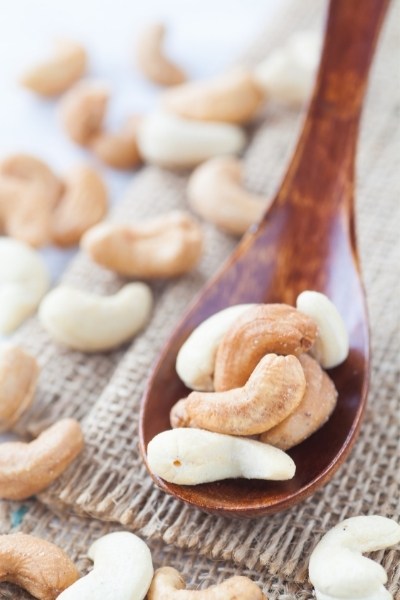
If you eat raw cashews, make sure to stick to an even lower serving. Or, if your symptoms are more severe, avoid this type of nuts altogether to stay as healthy as possible and avoid any unpleasant symptoms.
Is cashew butter low in FODMAPs?
Cashew butter, just like other types of nut butter, is allowed on a low FODMAP diet. As long as you consume a serving of 10 g of cashew butter – which is around half a tablespoon – you shouldn’t experience any negative symptoms.
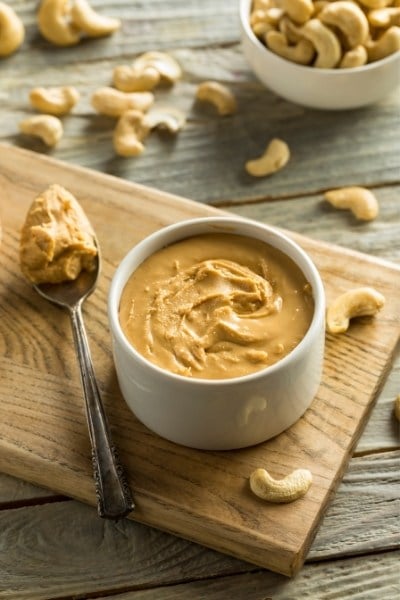
But make sure to carefully measure portion sizes, as it’s easy to consume more nut butter than one serving.
And eating too much cashew butter can trigger many symptoms of IBS and other digestive system issues.
Conclusion
Cashews are among the type of foods that should be limited on a low FODMAP diet. This is because they contain quite a lot of fermentable and nondigestible carbs in a single serving.
If your IBS symptoms aren’t too severe, though, you might want to indulge in a few cashews from time to time.
This is beneficial as they’re rich in nutrients like healthy fats, protein, vitamin K, copper, and various other minerals.
So, eating cashews can greatly impact your health and well-being.
Sources: Nutrition Data, National Library of Medicine, and PMC
